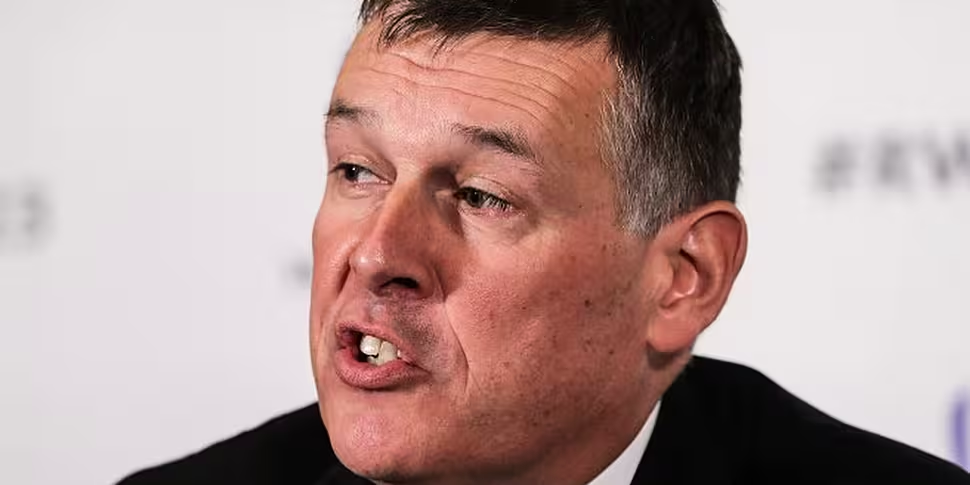IRFU CEO Philip Browne says Munster had the final say on the signing of Gerbrandt Grobler.
The lock served a two-year ban for doping after admitting to taking an anabolic steroid in 2015 while playing for Western Province in South Africa.
He admitted to taking the drug Drostanolone. His arrival at Munster ignited a debate about why the IRFU and the province decided to add a doper to their squad.
Off the Ball’s Ger Gilroy met Browne at Lansdowne Road on Wednesday, where he was present to announce that Aviva have extended their deal to the naming rights to the stadium until 2025.
TRANSCRIPT OF THE INTERVIEW
Ger Gilroy: The grassroots is obviously a big issue this week, people are concerned about the fact that Munster have hired someone who is a confessed doper and there’s been a series of questions. You personally have been involved with the anti-doping within rugby for decades back now and reading your report, the opening line from 2015-16 was ‘we’ve got a zero tolerance policy to this’. That’s not actually the case though; you don’t have a zero tolerance policy if you hire someone who is a cheat.
Philip Browne: I think the first thing to do is to outline very clearly what the environment is here in Irish rugby, we are probably the most stringent country in the world in terms of rugby, in terms of anti doping when it comes to rugby...
GG: Why would you risk that? Why would you risk that environment?
PB: Let me just explain exactly how our system works, we operate with Sport Ireland very closely. We have over 70% of the user pay test are actually for rugby, we target very carefully who we test particularly at underage level to ensure that we have players coming through the system who are effectively clean.
GG: And that’s great Philip, the only difficulty is that every sport in the world says they’re the cleanest like Lance Armstrong never failed a drugs test famously, so drugs testing is important...
PB: If you let me just continue I’ll move it along, the situation in terms of Grobler is: here’s a young man, 20 years of age who made a poor decision, made a very poor decision.
GG: Do we know it was a poor decision, do we know if it was a decision that the team inflicted on him, how much about the due diligence of the precise situation did we do?
PB: It’s a poor decision, at the end of the day he’s a 20 year old, he’s served his term, he did his two years. He played in France last year, this year Munster had a crying need for a second row, this name come up and they made a decision.
GG: Who made that decision?
PB: (Pauses) At the end of the day Munster made that decision in conjunction with the IRFU.
GG: So you and David Nucifora and Rassie Erasmus?
PB: Decisions are made through the high performance department in terms of the branches, if they wish to bring in a foreign players they must consult with the high performance department and the high performance department then in discussions with the province will decide whether it is appropriate or not.
GG: So you signed off on it?
PB: The bottom line here is that the young man is here for the year and at the end of the day he is operating in a very different environment to that that he’d be working in in any other country, given the level of testing we do.
GG: But why are you poisoning the Munster brand by bringing in a drugs cheat, I don’t understand that?
PB: The emphasis we put on anti doping in this country is significant, we have four people, one person in each province working on our spirit programme on anti doping, if you’d like me to explain, I’ll explain.
GG: But why do you risk all that?
PB: I’ll just continue, let me explain. The bottom line is we have a medical system, we have an anti doping system, we have an educational system, all of which is geared to ensure that we have a clean environment and a safe environment for players to play in.
GG: Then you bring a cheat in though.
PB: In relation to the Grobler situation, the answer really is, firstly, there was no specific policy at that particular time to deal with that particular set of circumstances...
GG: Did you talk about it? Did you say this guy has tested positive for anabolic steroids, let’s have a chat about it?
PB: I certainly didn’t talk about it, because that doesn’t come to me. At the end of the day I’m not ducking the issue, the issue here is not something that we should or should not do, I think that it’s a valid question and it’s a question we have to take on board and I think it’s something we have to consider.
GG: Should he play over the course of the rest of the season?
PB: At the end of the day, the man is under a contract, he’s a 20-year-old, well he’s not 20 years old now...
GG: But you can pay that contract up and make sure he doesn’t play.
PB: At this stage, the bottom line is he’s on the roster at Munster, he’s playing with Munster and I think the man should be given a chance to do what he is paid to do and do what he is entitled to do in terms of his chosen path and his chosen career.
GG: Even though it damages the Munster brand?
(IRFU Media & Communications Officer David O Siochain interrupts: “Ok Ger we got to wrap this up now ok”)
PB: At the end of the day what we’ll do is obviously take on board the views that have been expressed both publicly and privately and we’ll have to consider, do we need a policy and how should we consider dealing with that set of circumstances in the future.
GG: Philip, thanks very much.
PB: Ok













